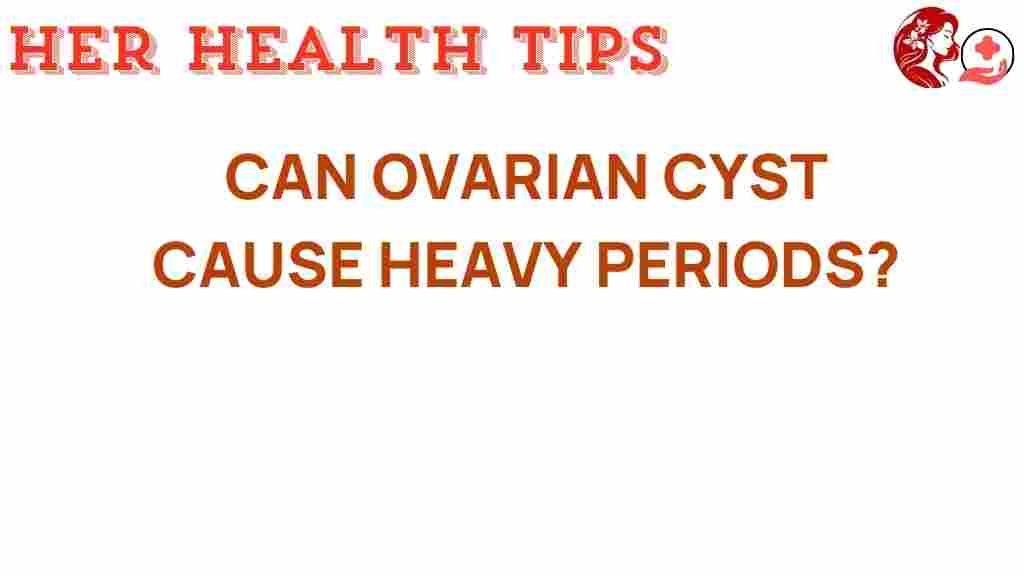Unveiling the Link: Can Ovarian Cysts Cause Heavy Periods?
Women’s health encompasses a wide range of issues, and when it comes to reproductive health, understanding the connection between ovarian cysts and heavy periods is crucial. Many women experience fluctuations in their menstrual cycle, and one of the most common concerns is heavy periods, also known as menorrhagia. This article will explore the relationship between ovarian cysts and heavy periods, including symptoms, diagnosis, treatment options, and how hormone imbalance plays a role in these conditions.
Understanding Ovarian Cysts
Ovarian cysts are fluid-filled sacs that develop on the ovaries. They are relatively common and can occur during a woman’s menstrual cycle. Most ovarian cysts are benign and often resolve on their own without the need for treatment. However, some cysts can cause significant symptoms and complications.
- Types of Ovarian Cysts:
- Functional cysts: These are the most common type and usually form during the menstrual cycle.
- Dermoid cysts: These contain various tissues, such as hair and skin cells.
- Cystadenomas: These develop from the cells on the outer surface of the ovaries.
- Endometriomas: These are associated with endometriosis, a condition where uterine lining tissue grows outside the uterus.
The Menstrual Cycle and Heavy Periods
The menstrual cycle is a complex interplay of hormones, including estrogen and progesterone. Heavy periods can result from various factors, including hormonal imbalances, uterine disorders, and, as we will explore, ovarian cysts. A typical menstrual cycle lasts between 21 to 35 days and involves several phases:
- Follicular phase: The phase where follicles in the ovaries mature.
- Ovulation: The release of an egg from a mature follicle.
- Luteal phase: The phase following ovulation where the body prepares for a potential pregnancy.
When ovarian cysts disrupt this cycle, they can lead to irregularities, including heavy bleeding during menstruation.
How Ovarian Cysts Affect Menstrual Cycles
Ovarian cysts can impact menstrual cycles in several ways:
- Hormone Imbalance: Ovarian cysts, especially functional cysts, can lead to fluctuations in hormone levels, primarily estrogen and progesterone. This imbalance may result in heavier periods.
- Physical Discomfort: Large cysts can cause pelvic pain or pressure, which may exacerbate menstrual symptoms.
- Irregular Cycles: Some women with ovarian cysts experience irregular periods, which can lead to prolonged or heavier menstrual bleeding.
Symptoms of Ovarian Cysts
While many women with ovarian cysts may not experience noticeable symptoms, others may encounter various signs. Common symptoms include:
- Pain or discomfort in the abdomen or pelvis
- Menstrual irregularities, including heavy periods
- Pressure symptoms, such as frequent urination or difficulty emptying the bladder
- Changes in bowel habits
- Breast tenderness
If you notice these symptoms, it is essential to consult a healthcare provider for an accurate diagnosis.
Diagnosis of Ovarian Cysts
Diagnosing ovarian cysts typically involves several steps:
- Medical History: Your doctor will review your symptoms and menstrual history.
- Physical Examination: A pelvic exam may help identify any abnormalities.
- Imaging Tests: Ultrasound is commonly used to visualize ovarian cysts and assess their size and type.
- Blood Tests: Hormonal levels may be assessed to determine any imbalances.
Once diagnosed, your doctor will discuss potential treatment options based on the type and severity of the cysts.
Treatment Options for Ovarian Cysts
Treatment for ovarian cysts varies depending on several factors, including the type of cyst, its size, and the severity of symptoms. Options may include:
- Watchful Waiting: Many cysts resolve on their own, and your doctor may recommend monitoring your condition with regular follow-ups.
- Medications: Hormonal contraceptives can help regulate the menstrual cycle and prevent the formation of new cysts.
- Surgery: In cases of large or persistent cysts, surgical intervention may be necessary to remove the cyst or, in some cases, the ovary.
It’s essential to discuss these options with your healthcare provider to determine the best course of action for your specific situation.
Managing Heavy Periods
If ovarian cysts are contributing to heavy periods, there are various strategies you can employ to manage this symptom:
- Track Your Cycle: Keeping a menstrual diary can help you identify patterns and triggers related to heavy bleeding.
- Maintain a Healthy Lifestyle: Eating a balanced diet, exercising regularly, and managing stress can help regulate your menstrual cycle.
- Medication: Over-the-counter pain relievers can alleviate discomfort associated with heavy periods.
- Consult a Gynecologist: If heavy periods persist, it’s important to seek professional advice to explore further treatment options.
When to See a Doctor
It’s crucial to seek medical attention if you experience any of the following:
- Heavy bleeding that soaks through one or more sanitary pads or tampons every hour for several hours
- Periods lasting longer than a week
- Severe pelvic pain
- Unexplained weight gain or loss
- Changes in bowel or urinary habits
These could be signs of a more severe condition requiring immediate evaluation and treatment.
Conclusion
In conclusion, there is a significant link between ovarian cysts and heavy periods. Understanding how ovarian cysts can cause hormonal imbalances that lead to irregularities in the menstrual cycle is crucial for women’s health. Recognizing the symptoms, seeking proper diagnosis, and exploring treatment options can empower women to manage their health effectively.
For further information on women’s health issues, consider consulting with a gynecologist or visiting reliable health resources. Remember, maintaining open communication with your healthcare provider is essential in addressing any concerns related to ovarian cysts and heavy periods.
To learn more about menstrual health, visit this informative resource. For personalized advice, reach out to a local healthcare professional or gynecologist.
This article is in the category Reproductive and created by HerHealthTips Team
